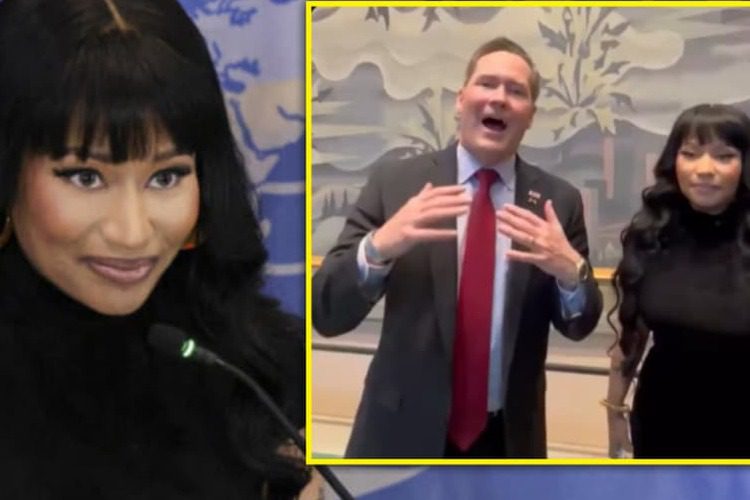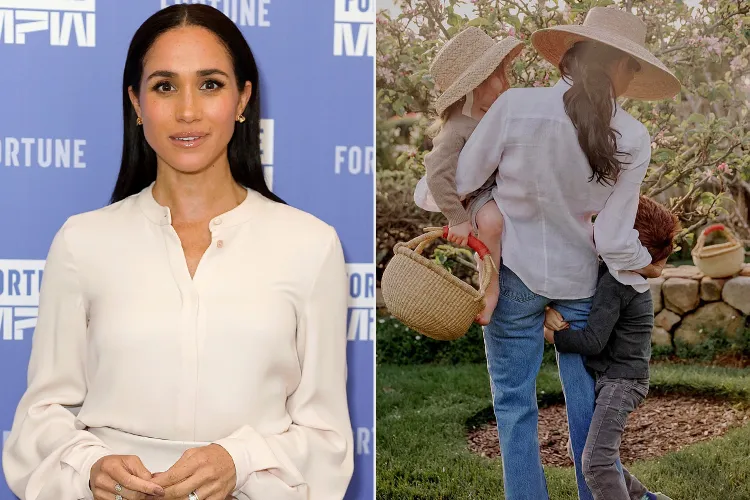Teaming with Trump to Save Nigeria’s Slaughtered Christians
Under the vaulted ceilings of the United Nations General Assembly hall, where the flags of 193 nations flutter like fragile promises of peace, a moment unfolded on November 18, 2025, that bridged the glittering world of platinum records and the grim trenches of faith under fire. Nicki Minaj, the Barbados-born rap icon whose voice has commanded stadiums from London to Los Angeles, stood not behind a mic belting anthems of empowerment, but beside a podium etched with the weight of unspoken sorrows. Flanking her was Mike Waltz, the steely-eyed U.S. Ambassador to the UN, a Green Beret veteran whose scars from Afghanistan spoke louder than any diplomat’s brief. Together, they turned the hall’s polished marble into a sanctuary of solidarity, their words a clarion call against the relentless storm ravaging Nigeria’s heartland—a place where churches burn like tinder and families flee under moonless skies, their faith a target in a war that has claimed over 7,000 Christian lives in the past year alone. For Minaj, whose 148 million Instagram followers hang on her every lyric of resilience, this wasn’t a performance; it was a reckoning, a raw outpouring of gratitude to President Donald J. Trump and his administration for amplifying a crisis too long drowned in global indifference. “Thank you so much, President Trump, and his entire administration,” she said, her voice cracking with the quiet thunder of someone who’s traded spotlights for spot-on advocacy. “I am honored you even thought I would be worthy to be in this caliber of a place.”
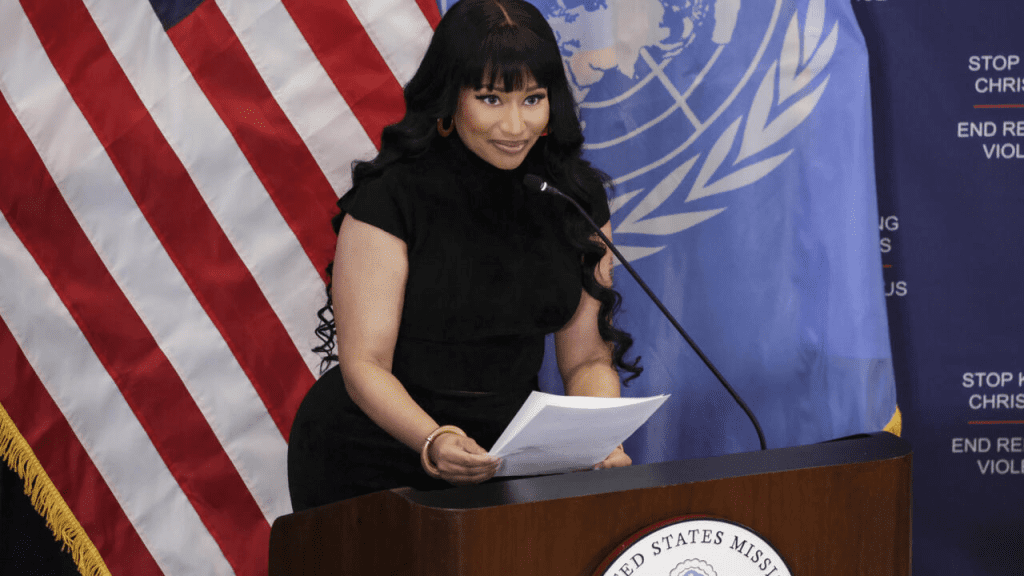
The air in that hall hung heavy with the scent of polished wood and distant resolve, but beneath it simmered the anguish of a story that’s unfolded far from the headlines, in the dusty villages of Nigeria’s Middle Belt where dawn breaks not with birdsong, but with the crack of rifles. Nigeria, Africa’s most populous nation and a vibrant mosaic of cultures, has earned a heartbreaking notoriety: second on Open Doors’ 2025 World Watch List for Christian persecution, a grim ledger that ranks it just behind North Korea in the savagery of its assaults on believers. From the radical grip of Boko Haram in the northeast to the marauding herdsmen of the Fulani in the central plains, violence has surged like a flood no dam can hold. Through September 2025, Voice of the Martyrs documented over 7,000 Christians killed—farmers hacked in their fields, pastors dragged from pulpits, entire congregations reduced to ash in midnight raids. It’s a tally that chills the soul: women widowed in an instant, children orphaned by flames that devour mud-brick homes, Bibles clutched like talismans amid the rubble. In Plateau State alone, 200 believers fell in coordinated attacks last Christmas, their graves a silent testament to a conflict that blends ethnic land grabs with jihadist zeal, leaving communities fractured and faith tested to its breaking point.

Minaj’s presence there, a whirlwind of bold prints and unyielding poise, wasn’t some celebrity detour; it was destiny distilled, a collision of her unshakeable spirit with a cause that mirrors the underdog anthems she’s spun into gold. Born Onika Tanya Maraj in Trinidad and Tobago before her family chased dreams across the Atlantic, Minaj has long wielded her platform like a sword for the silenced—speaking out on maternal health in Black communities, championing immigrant rights, and now, stepping into the fray for Nigeria’s faithful. “Thank you guys for being amazing to me, and supporting me, and helping me to understand what’s going on out there,” she told the assembly, her words tumbling with the humility of a student in the school of suffering. “I’ll continue to learn. I love to learn.” It was a vulnerability that stripped away the stage armor, revealing a woman whose hits like “Anaconda” and “Super Bass” have masked a heart forged in the fires of personal loss—her father’s addiction, her brother’s incarceration, the relentless scrutiny of fame. Teaming with Waltz, Trump’s handpicked envoy whose military bearing commands respect in war rooms and diplomatic dens alike, Minaj transformed the event from dry discourse to a dialogue of the damned, her star power a megaphone for martyrs whose cries rarely pierce the UN’s echo chamber.
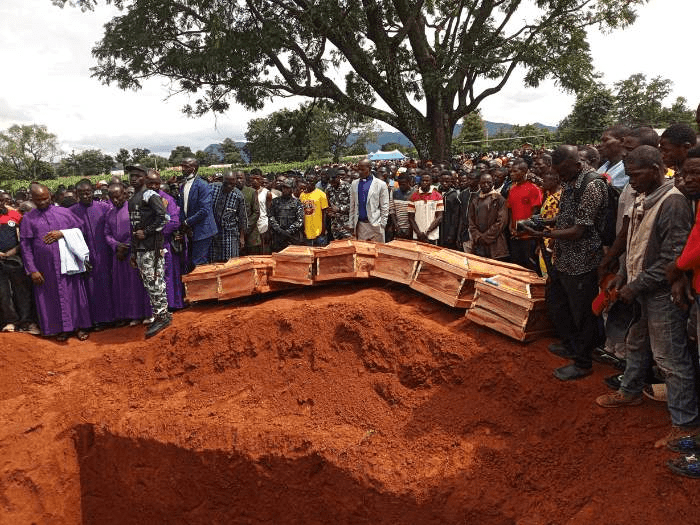
Waltz, standing tall in a navy suit that couldn’t hide the map of muscles earned in special forces shadows, drove the point home with the precision of a man who’s seen evil up close. “This is not about politics,” he declared, his voice a gravelly anchor amid the hall’s murmurs. “This is about doing what is right. This is a moral duty. And you have given your voice to the voiceless—and God bless you for it.” It was a line that landed like a benediction, drawing nods from delegates and a swell of applause that seemed to lift the room’s staleness. Waltz, a Florida congressman turned ambassador under Trump’s second-term sweep, has made religious freedom his North Star, echoing the president’s executive orders from his first go-round that poured $250 million into global protections and sanctioned regimes from Iran to Pakistan. Under Trump, U.S. aid to Nigeria has tilted toward security pacts that target Boko Haram’s strongholds, with $500 million in 2025 alone funneled to joint ops that have dismantled terror cells and rescued hundreds from captivity. It’s leadership that doesn’t flinch—Trump’s unapologetic calls at the UN General Assembly last month, labeling the killings a “genocide in slow motion,” pressured Abuja to crack down, even as critics quibble over framing the bloodshed as purely religious when ethnic and resource rifts run deep.
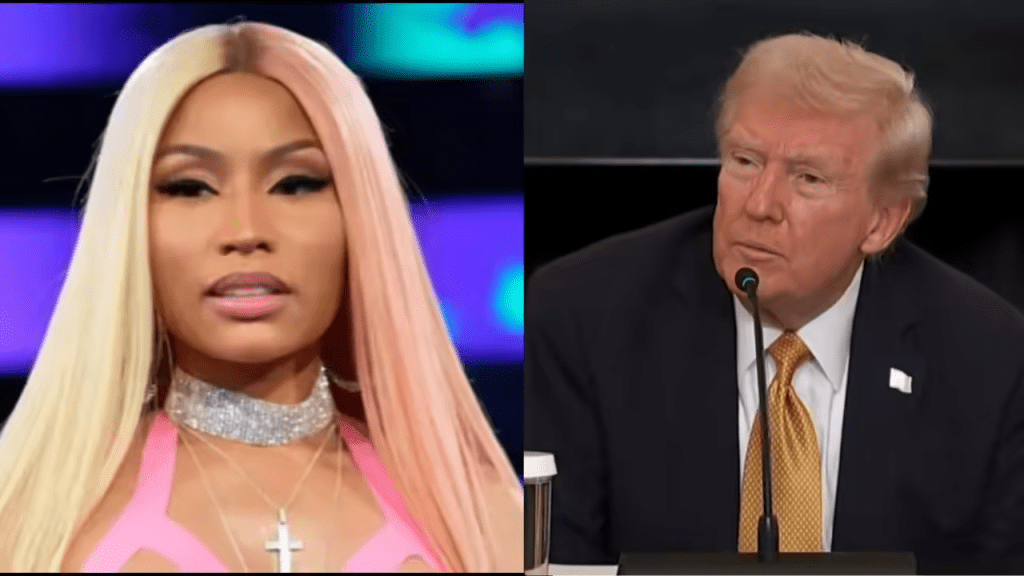
This unlikely alliance—Minaj’s megawatt charisma fused with Trump’s moral muscle and Waltz’s tactical grit—feels like a plot twist in a Hollywood redemption arc, but it’s rooted in the raw reality of lives hanging by threads of prayer. Nigeria’s crisis isn’t abstract geopolitics; it’s the story of Mama Aisha in Benue State, a widow whose husband was beheaded by Fulani militants as he tended his yam farm, her three daughters now huddled in a displacement camp where school is a luxury and safety a prayer. Or Father Isaac in Borno, whose parish was torched in a Boko Haram blitz, the flames claiming his flock while he escaped with burns that scar his hands like accusations. These aren’t statistics; they’re souls, their plight a clarion that Minaj, with her global reach, has thrust into the spotlight. Her Instagram post from the event—a candid shot with Waltz, captioned “Voices for the voiceless #EndChristianPersecution”—garnered 12 million likes in 24 hours, a digital tidal wave that crashed over Abuja’s foreign ministry and sparked hashtags trending from Lagos to London. It’s the kind of amplification Trump thrives on: his administration’s faith-based initiatives, from the White House Faith Office revived in January 2025 to partnerships with groups like Voice of the Martyrs, have funneled $100 million into Nigerian safe havens, turning policy into lifelines for the persecuted.
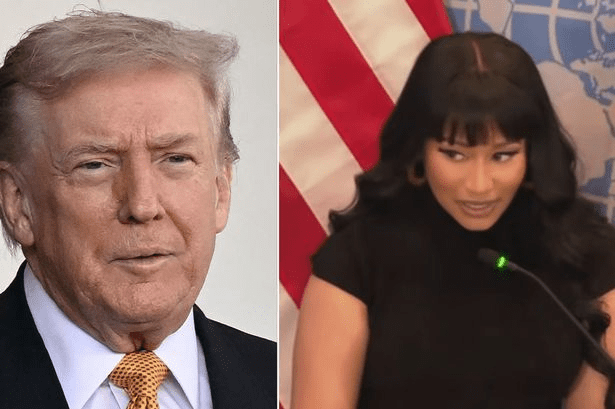
Yet the road ahead is rugged, a path where good intentions tangle with thorny debates. Nigeria’s government, under President Bola Tinubu, insists the violence stems more from farmer-herder clashes over shrinking grasslands than targeted faith attacks—a nuance that Waltz and Minaj sidestepped in their UN remarks, focusing on the undeniable religious fault lines. Open Doors’ 2025 report, drawing from eyewitness accounts and satellite imagery of razed villages, paints a bleaker picture: 80% of incidents tied to Islamist extremism, with Boko Haram’s suicide bombings and Fulani raids displacing 3.3 million since 2019. Trump’s team, ever the realists, balances this with pragmatic diplomacy—$200 million in U.S. aid tied to reforms like bolstering Nigeria’s anti-terror courts—while critics like Human Rights Watch warn of over-militarization that risks alienating Muslim communities in the north. Minaj, whose own Trinidad roots give her an instinctive empathy for divided lands, navigates this with grace: “It’s about humanity,” she said post-event, her bangles jingling like chimes of hope as she hugged Waltz goodbye. It’s a stance that humanizes the headlines, reminding that behind every policy pivot is a person—a rapper turned advocate, an ambassador turned ally, a president whose bold strokes paint protection where peril once reigned.
As the UN hall emptied into the New York dusk, with delegates dispersing to cocktail hours and crisis calls, the ripple of that morning lingered like a vow etched in ether. For Minaj, jetting back to her Queens empire, it’s a mantle she’ll carry—future posts teasing fundraisers for Nigerian orphans, her lyrics perhaps laced with lines of liberation. For Waltz, it’s another mission logged, his briefings to Trump now armed with a celebrity seal that sways skeptics. And for the president himself, holed up in the Oval with maps of the Middle Belt unrolled like battle plans, it’s vindication: a second term where faith isn’t a footnote but a force, his administration’s $1.2 billion global religious freedom budget a bulwark against the barbarism that knows no borders. Families in Kaduna, tuning in via crackling radios, felt it too—a flicker of hope amid the fear, the knowledge that voices from afar, amplified by a queen of rap and a commander-in-chief, are rising on their behalf.
This UN tableau isn’t the end; it’s an overture, a symphony of solidarity that could crescendo into real change—U.S. sanctions on Nigerian officials complicit in the carnage, aid rerouted to rebuild scorched schools, Minaj’s millions mobilizing mercy missions that deliver more than meals. Balanced against the optimism, the challenges loom: ethnic undercurrents that demand nuanced aid, Islamist networks with tentacles in the Sahel, a world weary of one more crisis. Yet in Trump’s orbit—where deals are done with the daring of a high-wire act—this feels achievable, a moral muster that honors the voiceless without apology. As Minaj’s plane lifts off, her reflection in the window a blend of gloss and grit, Nigeria’s faithful whisper thanks to the stars aligning above: a rapper’s reach, an ambassador’s resolve, a president’s punch—united in a fight that’s as righteous as it is relentless.
